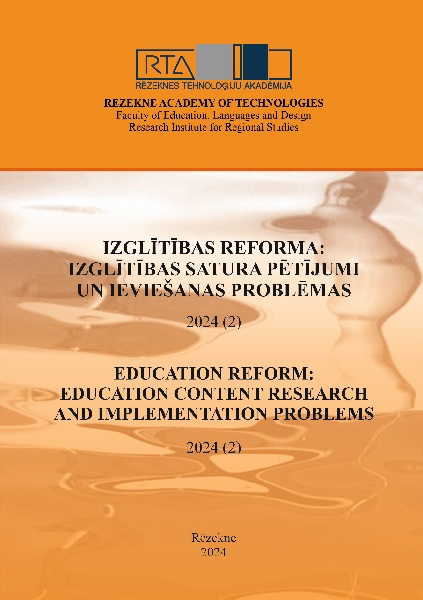INTEGRATION OF ECOSCHOOL IDEAS FOR THE DEVELOPMENT OF ENVIRONMENTAL CONSCIOUSNESS IN THE 3RD STAGE OF PRESCHOOL EDUCATION
DOI:
https://doi.org/10.17770/er2024.2.8272Keywords:
child, Ecoschool, environmental education, environmental consciousness, preschoolAbstract
From preschool age, it is necessary to instill in children love for the environment, the ability to protect and increase natural wealth. That is why environmental education and the formation of environmental culture for preschool children come to the fore. These indicators can be improved by educating children about this in preschool, creating environmental awareness and experience in sorting waste.
The aim of the article: to analyse the need for the development of environmental consciousness and the possibilities of integration of ecoschool ideas in working with children of the 3rd stage of pre-school education.
Research methods: Literature analysis; Questionnaire; Observation of children; Data analysis in SPSS.
Concludes that to draw attention to environmental consciousness, the Ecoschool program in an educational institution is necessary. But the preschool can integrate the Ecoschool Action Plan during the school year to promote environmental awareness, if for certain reasons, does not participate in the Ecoschool program.
References
Dababneh, K., Ihmeideh, F. M., & Al‐Omari, A. A. (2010). Promoting kindergarten children’s creativity in the classroom environment in Jordan. Early Child Development and Care, 180(9), 1165–1184. DOI: https://doi.org/10.1080/03004430902872950
Krastiņa, E. (2023). Pašregulācijas paradumu veidošanās pirmsskolā. Veselības aprūpe: Realitāte un izaicinājumi, 70 - 77. Daugavpils: Daugavpils Universitātes aģentūras Daugavpils Universitātes Daugavpils medicīnas koledža.
Dzene, L. (2024). Ekoskolas ideju integrācija vides apziņas attīstībai pirmsskolas izglītības 3. posmā. Nepublicēts materiāls. Rēzekne: RTA.
Ekoskola.lv. (n.g.a). Kas ir Ekoskolu programma? Retrieved from: https://ekoskolas.lv/
Ekoskola.lv. (n.g.b). Kā viss sākās Retrieved from.: https://ekoskolas.lv/lv/par-mums/ka-viss-sakas
Fushtei, O., Sarancha, I. (2023). Formation of environmental culture in preschool. Personality and Environmental Issues, 4(2), 21-25. DOI: https://doi.org/10.31652/2786-6033-2023-2(4)-21-25
Geske, A., Grīnfelds, A. (2020). Izglītības pētījumu aptaujas – no izveidošanas līdz datu apstrādei. Rīga: LU Akadēmiskais apgāds.
Görkem, A. V. C. I., & Gümüş, N. (2020). The effect of outdoor education on the achievement and recall levels of primary school students in social studies course. Review of International Geographical Education Online, 10(1 (Special Issue)), 171-206. DOI: https://doi.org/10.33403/rigeo.638453
Gvi. (n.g.). Kā skolās audzināt vides apziņu. Retrieved from: https://www.gvi.co.uk/blog/how-to-cultivate-environmental-awareness-in-schools/
Jackson, J. J., & Beck, E. D. (2021). Personality development beyond the mean: Do life events shape personality variability, structure, and ipsative continuity?. The Journals of Gerontology: Series B, 76(1), 20-30. DOI: https://doi.org/10.1093/geronb/gbaa093
Jankovska, J., (08.09.2022). Pirmsskolas un skolas pēctecība iekļaujošas izglītības kontekstā. Retrieved from: https://www.ikvd.gov.lv/lv/media/4148/download
Lisboa, P. V., Gómez-Román, C., Guntín, L., & Monteiro, A. P. (2024). Pro-environmental behavior, personality, and emotional intelligence in adolescents: A systematic review. Frontiers in Psychology, 15, Article 1323098. DOI: https://doi.org/10.3389/fpsyg.2024.1323098
Sebre, S., Miltuze, A. (2022). Attīstības psiholoģija. Rīgā: Apgāds Zvaigzne ABC
Seldins, T. (2020). Izaudzināt brīnišķīgu Montesori metode. Rīgā: Apgāds Zvaigzne ABC
Taylor, A. F., & Butts-Wilmsmeyer, C. (2020). Self-regulation gains in kindergarten related to frequency of green schoolyard use. Journal of environmental psychology, 70, 101440.
Thor, D., & Karlsudd, P. (2020). Teaching and fostering an active environmental awareness design, validation and planning for action-oriented environmental education. Sustainability, 12(8), 3209. DOI: https://doi.org/10.3390/su12083209
Türkoğlu, B. (2019). Opinions of preschool teachers and pre-service teachers on environmental education and environmental awareness for sustainable development in the preschool period. Sustainability, 11(18), 4925. DOI: https://doi.org/10.3390/su11184925
Vides aizsardzības un reģionālās attīstības ministrija. (2022). Aptauja: 76% Latvijas iedzīvotāju iesaistās atkritumu šķirošanā, tomēr neliela daļa šķiro visus populārākos ikdienā radītos atkritumus. Retrieved from: https://www.varam.gov.lv/lv/jaunums/aptauja-76-latvijas-iedzivotaju-iesaistas-atkritumu-skirosana-tomer-neliela-dala-skiro-visus-popularakos-ikdiena-raditos-atkritumus
Vides izglītības fonds. (n.g.). Ekoskolu metodiskais materiāls pirmsskolas izglītības iestādēm. Retrieved from: http://old.videsfonds.lv/documents/ekoskolu-dabas-izgl-t-bas-materi-ls-pirmsskol-m.pdf
Xie, Y., Zheng, Y., & Yang, Y. (2023). The relationship between students’ awareness of environmental issues and attitudes toward science and epistemological beliefs—Moderating effect of informal science activities. Research in Science Education, 53(1), 1185–1201. DOI: https://doi.org/10.1007/s11165-023-10126-5






